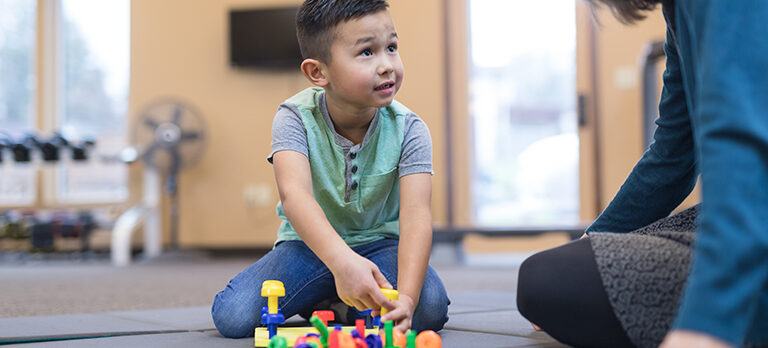Every day we perform a variety of different tasks like getting dressed, eating, bathing and writing notes, just to name a few. We take the ability to do these for granted because, while these seem like simple, ordinary tasks to most, for people with certain medical conditions or illness these activities are difficult or even impossible. That’s where occupational therapy, also known as OT, can help.
OT is a type of rehabilitative care that focuses on helping people of all ages perform daily tasks by improving fine and gross motor skills. It also includes making your home, school or workplace environment easier for you to navigate for your everyday life.
An occupational therapist is a graduate trained and licensed health care professional who, after a thorough evaluation, will design a specific treatment plan tailored to your needs. This plan will likely include a variety of therapeutic exercises, manual techniques and educational instruction.
How does OT help?
- Learn or relearn how to perform daily tasks, such as getting dressed, eating, and bathing
- Assess your home, school, or workplace to identify ways to make your daily tasks easier
- Teach you how to use assistive devices, such as wheelchairs and walkers
- Help you with tasks that require fine motor skills, such as writing or buttoning a shirt
- Show you exercises you can perform to help increase flexibility or reduce pain
- Educate your loved ones and caregivers on how to effectively support you in your day-to-day life
How does OT help kids?
OT helps kids play, improves their school performance, and aids their daily activities. It also boosts their self-esteem and sense of accomplishment. With OT, kids can:
- Develop fine motor skills so they can grasp and release toys and develop good handwriting or computer skills.
- Improve eye/hand coordination so they can play and do needed school skills such as bat a ball and copy from a blackboard.
- Master basic life skills such as bathing, getting dressed, brushing teeth, and self-feeding.
- Learn positive behaviors and social skills by practicing how they manage frustration and anger.
- Get special equipment to help build their independence. These include wheelchairs, splints, bathing equipment, dressing devices, and communication aids.
What conditions do Occupational Therapists treat?
Occupational therapists aren’t just for people with major medical conditions, such as a stroke. They treat a wide range of physical and cognitive conditions in people and children of all ages. Conditions treated at Woman’s Therapy include:
- Lymphedema
- Neurological disorders
- Cognitive (thinking and learning) issues
- Infant feeding issues
- Picky Eaters
- Fine-Motor Deficits
- Handwriting issues
- Sensory Processing Disorder
- Autism
- Developmental Delay
- Cerebral Palsy
Woman’s Occupational Therapy Program
Woman’s Occupational Therapy services are available for children, men and women. Offices are located at Woman’s Center for Wellness, the corner of Jefferson Highway and Bluebonnet. For more information, call 225-924-8450.

